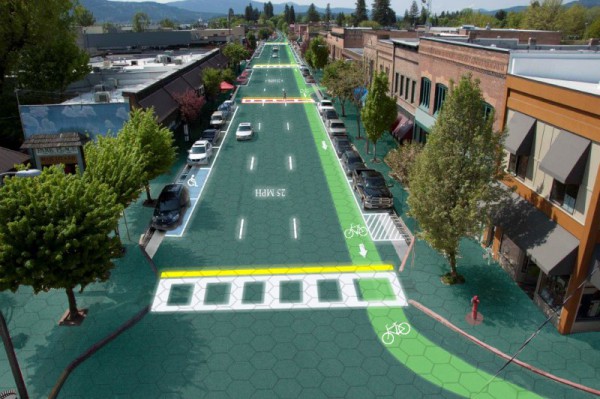The Solar roadways project took the internet by storm when it first went up for funding on Indiegogo. The project has already surpassed its $1 million goal and now it looks to be closing in on the $2 million mark, bringing the world changing project closer to reality.
The initial funding is only going to take the project so far, it's going to allow for the Solar Roadway creators, Scott and Julie Brusaw, to hire engineers and a team of people to help streamline the technology, which will then allow for it to go in to full production. If you haven't come across the Solar Roadways project just yet then watch this video: [yframe url='http://www.youtube.com/watch?v=qlTA3rnpgzU']
This second video is a little more informative but not as fun to watch: [yframe url='http://www.youtube.com/watch?v=SNMFKKyFU60′]
The solar roadways project already received two phases of funding from the U.S. Federal Highway Administration, phase one allowed for the research and development of the technology while phase two of the contract requires the team to build a functioning car park for demonstration purposes.
This project will eventually pay for itself as the roads will generate clean energy, powering cities through the sun. It has been estimated that if all of the roads in the US were replaced by these solar panels then it would generate 3 times more energy than what is currently used. This could help eliminate the need for fossil fuels and even pave the way for electric cars that run off of clean energy and can charge on the road.
You can check out the Indiegogo project page, HERE.
Discuss on our Facebook page, HERE.
KitGuru Says: This technology could help make the world a better place and would solve a ton of problems. It'll take years for it to spread across the planet but it will be pretty awesome when it finally does. What do you guys think of this? Is it a feasible project? Would it really have that much of an effect on the planet?
 KitGuru KitGuru.net – Tech News | Hardware News | Hardware Reviews | IOS | Mobile | Gaming | Graphics Cards
KitGuru KitGuru.net – Tech News | Hardware News | Hardware Reviews | IOS | Mobile | Gaming | Graphics Cards




defiantly not feasible in large scale, but cool and possible for some small venues
My concerns:
Price – Surely this costs many times more to build than regular roads and requires much more resources as well as infrastructure. Also, the maintenance costs are potentially much higher since it all requires new and more complicated equipment.
Durability – How durable really is it? A car accident would surely damage the panels enough for the need to replace them, whereas with asphalt this is not the case. Electronics do not have an infinite lifetime and malfunction relatively often. The repairing or replacement of these panels also takes much more time than fixing a regular road.
Maintenance – even if it is durable enough, it will still require consistent maintenance. The build up of dirt and rubber, as well as the growth algae and what not will result in the constant need of cleaning the panels. And since the surface is not polished glass, either chemicals or some sort of high pressure washers will need to be used on a regular basis. Otherwise the solar panels will loose all their purpose, since they won’t produce any electricity if the sun can’t reach them.
Noise – since the glass on the panels has very deep texture and the strong glass has much higher resonance levels than asphalt, this will create a high amount of noise while driving on it. Thus living next to such roads will become unbearable.
Grip – Is grip really as good as on asphalt? What if the surface is wet and sandy? I can’t see sand or water on glass resulting in the same amount of grip as on asphalt under the same circumstances.
Wear – As we all know, any hard surface wears eventually and becomes smooth and shiny. Thus in this case resulting in the loss of grip and the need of replacement. Although the re-smelting of glass may not be as bad as repaving roads with the regular stuff.
Tyre wear – the hard characteristics of glass will result in much greater tyre wear. Having deep grooves in it will make things only worse.
Lastly – car parks, really? Doesn’t anyone see the irony in this? When a car stands in a car park it will obstruct the light from getting to the panels thus rendering them useless